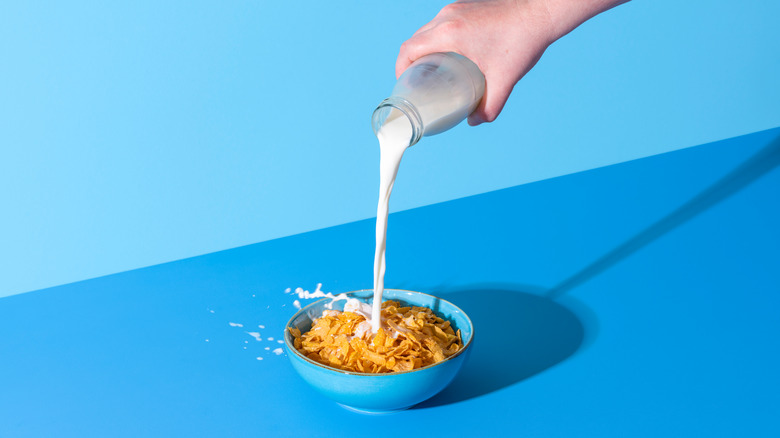The One Ingredient That Shouldn't Be In The Cereal You're Eating
If you're like most people, you grew up eating a bowl of cereal for breakfast every morning before school while reading the box and digging around in the cereal looking for the toy. Unfortunately, the cereal toys don't seem to exist anymore, but you can still enjoy a bowl of cereal for breakfast with your favorite milk — whether that be cow, soy, almond, rice, or oat milk. Which cereal you choose is the difference between it being a healthy choice or not.
In 1941, cereal makers began fortifying them with iron, folic acid, and other vitamins. Fortifying cereals helped reduce iron deficiency anemia and neural tube birth defects (via the National Library of Medicine). That sounds like they're good for you, right?
However, according to Britannica, ready-to-eat cereals are made with pre-cooked grains and sweetened. There are about four types of cereal — flaked, shredded, puffed, and granular, made from wheat, corn, and rice. The sweetening aspect and type of grain are what you should consider if you want to buy healthy cereal. The Dietary Guidelines for Americans recommends making half your grains whole grains for every meal, and adults need six ounces of grains per day — three of those need to be whole grains. So one cup of whole-grain cereal can help.
Added sugar is a problem in most cereals, but there is one other ingredient that shouldn't be in your cereal.
Butylated hydroxytoluene
Food blogger and activist Vani Hari, also known as Food Babe, started a campaign to get General Mills and Kellogg's to stop adding butylated hydroxytoluene (BHT) to their cereals.
According to the Food and Drug Administration, BHT is safe to use directly in foods in small amounts, and 50 parts per million is approved for use in dry cereals. However, some studies have shown it is a health risk when consumed in large amounts. National Library of Medicine's National Center for Biotechnology Information notes that BHT, a synthetic antioxidant used to preserve foods, can cause skin and eye irritation in large amounts.
The studies Food Babe points to are conducted on animals, but also state that this additive is unnecessary, so there's no need to take the risk. She also points out that Kellogg's and General Mills don't use BHT in their cereals in other countries, only in the United States.
Kellogg's points out that they have some cereals without BHT and use the smallest amount necessary in other cereals in the packaging. In addition, they say that they're listening to their consumers and are testing other natural ways to preserve their cereals without BHT.


